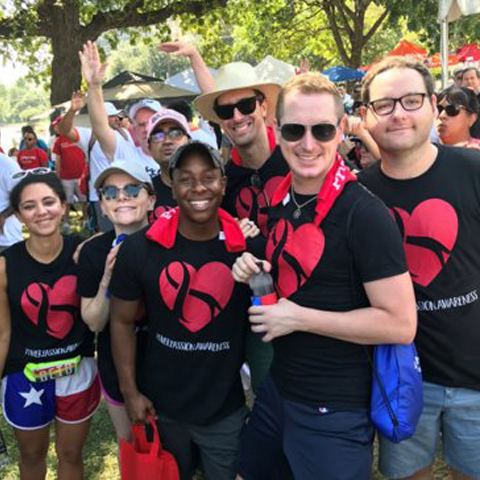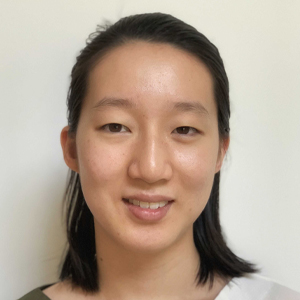
A space for LGBTQIA+ grad students to be their best
“It all started in a little room with about three people.”
That’s how Wesley Burford remembers the beginning of the Sexuality Alliance for Scientists, or SAS, at the University of Texas Southwestern. Seven years later, SAS is a chapter of the international organization Out in STEM, or oSTEM, and its membership has swelled to several dozen.
Burford was one of the people in that room back in 2016, along with two other founders and their faculty director, Nancy Street, who was then the dean of diversity and inclusion for the graduate school. He said he was approached by his fellow graduate student Jessica Hicks, who was passionate about starting an LGBTQIA+ group for the grad students on campus. Hicks became the first president of SAS, and Burford later took over as the second.

At the time, the U.S. was experiencing political upheaval around the so-called “bathroom bill” in North Carolina that barred transgender people from using restrooms consistent with their gender identity. Burford, who is from San Diego and attended college in San Francisco, was initially unsure what kind of reception their fledgling organization would receive in a state that has not historically been the most welcoming to queer people.
“Dallas is a very lovely area for LGBT people,” Burford said. “But overall … everybody understands that when you’re living in a space that's not always really inclined to support you, you live in that sort of limbo. And so we definitely wanted to make a community.”
Once they started, the organizers found a community that was willing and excited to show up. Among their earliest events were informal pizza party socials, where students could gather at a local pizza parlor to chat with their peers and faculty members.
Burford attributes their initial success in part to a core group of LGBTQIA+ and ally faculty members who were willing to advocate for their students. And as the students became more comfortable talking with the faculty, the value of the meetings grew.
“All of a sudden, you start having these really meaningful and helpful scientific discussions and career discussions and life discussions,” Burford said, noting that students who were initially intimidated by their professors found an environment conducive to conversations.
The socials also helped identify the needs of the queer community on campus. Many of the questions students had — for instance, “How ‘out’ should I be on a résumé?” — led to SAS events such as résumé workshops and networking opportunities.
SAS’s goal was to provide a safe space for LGBTQIA+ students, and the founding executive board was intentional about privacy measures such as not maintaining an official membership list.
“We were really interested in the beginning at not actively identifying queer people,” Burford said. “Our philosophy was, it’s the people who aren't going to step out from the shadows into the light that are the most vulnerable.”
The lack of a membership list led to some pushback from the university’s administration, but the group compromised by taking a head count at each event and having an optional sign-in sheet. The goal was to keep events open to all interested students, and they’ve maintained that philosophy over the years.
In 2020, SAS became a chapter of oSTEM, a national organization of LGBTQIA+ people in the science, technology, engineering and mathematics community. oSTEM has more than 100 student and professional chapters in the United States and abroad, so UT Southwestern joined a global network with this shift.
Grad student Richard Ruedas was president of SAS when they applied for oSTEM chapter membership. He recalls it was a relatively smooth process that involved an application form and a few signatures from administration and faculty and one that brought many benefits.

“We always want to increase our recruitment of LGBTQ folks to the graduate program here,” Ruedas said. “It made sense because oSTEM is chapter-based, which is nice, and has a lot of undergrad chapters all over the country.”
Similarly, grad student Anthony Hernandez Vasquez, who is now president of the oSTEM chapter, highlighted the advantage of belonging to a wider organization.“As a member of a larger community, we have access to a platform that allows us to extend our reach within our institution,” he said.
Having the oSTEM framework helped guide their activities, Vasquez added. These include social gatherings and seminars focused on advocacy and visibility of the LGBTQIA+ community.
Although some early networking hopes were thwarted by the COVID-19 pandemic, the UT Southwestern chapter attended oSTEM’s conference remotely for two years. In 2022, Burford and Ruedas, who are both still executive board members of the UT Southwestern chapter, attended oSTEM’s first in-person conference since the pandemic began.
When they arrived at the Boston Sheraton hotel where the conference took place, Ruedas was surprised by the 1,000-plus people in attendance, he said. “I wasn’t expecting it to be quite that large. But it was great. We networked with a lot of people and learned a lot of strategies that we can bring back to the chapter.”
He said one session offered information on organizing a regional conference, which could be useful for their chapter down the road.
Ruedas and Burford are now wrapping up their Ph.D.s and looking to turn their oSTEM responsibilities over to the next generation of grad students, including Vasquez. Both are optimistic about the future of the chapter. After a dip in engagement during the pandemic, these days about 25–30 people consistently attend the general meetings, and more attend career panels or seminars.
Ruedas looks forward to potential collaborations with other oSTEM chapters within the University of Texas system, including at UT Dallas, Austin and Arlington. Meanwhile, Burford said it was both “humbling and exciting” to see the directions the new executive board is taking — starting a book club, for instance. Now that the group is a chapter of an international organization, he sees more ways to provide students with opportunities such as going to a national conference or applying for oSTEM’s scholarship program. He also noted that these opportunities may take on more importance as the Texas university system recently paused new diversity, equity and inclusion efforts.
“And that, I think, is the most important,” Burford said. “It’s just to make sure that being a member of the LGBTQIA community is never an obstacle to doing great science, which is really the organizational motivation.”
“We're not here to do anything but help facilitate you being the best scientist and best student possible, and to communicate that having a fertile environment … is critical to you being the best scientist you can be.”
Enjoy reading ASBMB Today?
Become a member to receive the print edition four times a year and the digital edition monthly.
Learn moreGet the latest from ASBMB Today
Enter your email address, and we’ll send you a weekly email with recent articles, interviews and more.
Latest in Opinions
Opinions highlights or most popular articles

Women’s health cannot leave rare diseases behind
A physician living with lymphangioleiomyomatosis and a basic scientist explain why patient-driven, trial-ready research is essential to turning momentum into meaningful progress.

Making my spicy brain work for me
Researcher Reid Blanchett reflects on her journey navigating mental health struggles through graduate school. She found a new path in bioinformatics, proving that science can be flexible, forgiving and full of second chances.

The tortoise wins: How slowing down saved my Ph.D.
Graduate student Amy Bounds reflects on how slowing down in the lab not only improved her relationship with work but also made her a more productive scientist.

How pediatric cataracts shaped my scientific journey
Undergraduate student Grace Jones shares how she transformed her childhood cataract diagnosis into a scientific purpose. She explores how biochemistry can bring a clearer vision to others, and how personal history can shape discovery.

Debugging my code and teaching with ChatGPT
AI tools like ChatGPT have changed the way an assistant professor teaches and does research. But, he asserts that real growth still comes from struggle, and educators must help students use AI wisely — as scaffolds, not shortcuts.

AI in the lab: The power of smarter questions
An assistant professor discusses AI's evolution from a buzzword to a trusted research partner. It helps streamline reviews, troubleshoot code, save time and spark ideas, but its success relies on combining AI with expertise and critical thinking.

